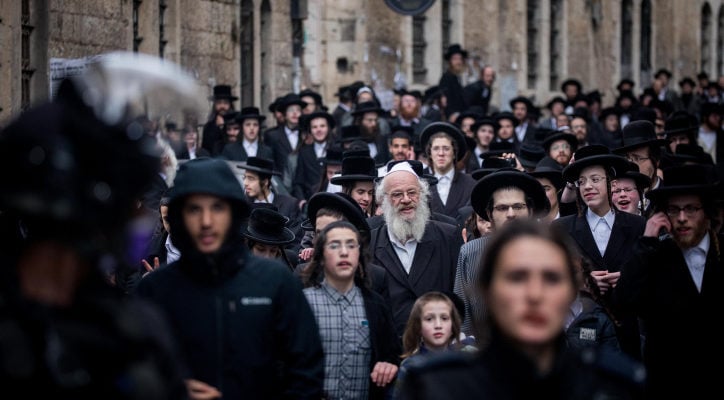Criticized for not applying law equally to Orthodox and secular Jews, police say fines were not given in order to prevent disturbances.
By Paul Shindman, World Israel News
The mayor of Bnei Brak defended his residents Sunday and said the vast majority are complying with health regulations after police failed to break up a funeral attended by hundreds of mourners in violation of a government ban on large gatherings.
Mayor Avraham Rubenstein rejected criticism he wasn’t doing enough to enforce social distancing and said most of the residents in the predominantly ultra-Orthodox city of some 200,000 people were doing their part to fight the spread of the coronavirus.
“Ninety-nine-point-nine percent of the public are listening to the guidelines,” Rubenstein told Israel Army Radio from his home where he is in quarantine because his wife tested positive for the virus.
Overnight, a crowd of 300 to 400 people, many of them walking side-by-side, attended the funeral procession for a prominent local rabbi in defiance of health rules banning large gatherings.
“Holding a mass funeral in Bnei Brak is a very serious and life-threatening incident that harms the public,” Interior Security Minister Gilad Erdan said, demanding that police enforce Health Ministry guidelines in all parts of the country with no exceptions.
However, police said a risk management assessment of the situation gave them no choice but to allow the funeral in order to avoid provoking a clash with the participants.
“We had two options: Cause a clash with the participants, thousands of whom could come out of their houses in the span of a few minutes, or wait until the funeral ended quickly and the crowd broke up,” police said in a statement reported by Times of Israel.
The decision not to issue fines brought criticism after police reported they handed out at least 849 fines to Israelis violating health restrictions, among them staying within 100 meters of their homes.
In one widely publicized incident, a video on social media showed a cyclist in Tel Aviv fleeing from two police cars that drove over grass and tennis courts in a park, attempting to stop him.
“Who is more dangerous to the public? A lone cyclist in Hayarkon Park or hundreds at one funeral in Bnei Brak?” a journalist wrote in Israel Hayom. “As far as the Tel Aviv Police Department is concerned… one lone bicyclist at the Hayarkon Park in Tel Aviv.”
Fines include 5,000 shekels ($1,400) “for disobeying a police officer’s instructions to disperse” and 500 shekels ($140) for “going out into the public space for a purpose or action that is in contravention of regulations.”
Mayor Rubenstein also complained that authorities had ignored his repeated calls for help in getting infected members of very large families out of crowded apartments and into treatment centers where they could be isolated and not infect those around them.
In response, Health Ministry Deputy Director General Prof. Itamar Grotto said hotels, currently empty due to the crisis, would be dedicated to the ultra-Orthodox community.
“We are working a lot with the ultra-Orthodox population to find specific solutions” Grotto told Israel Army Radio.





